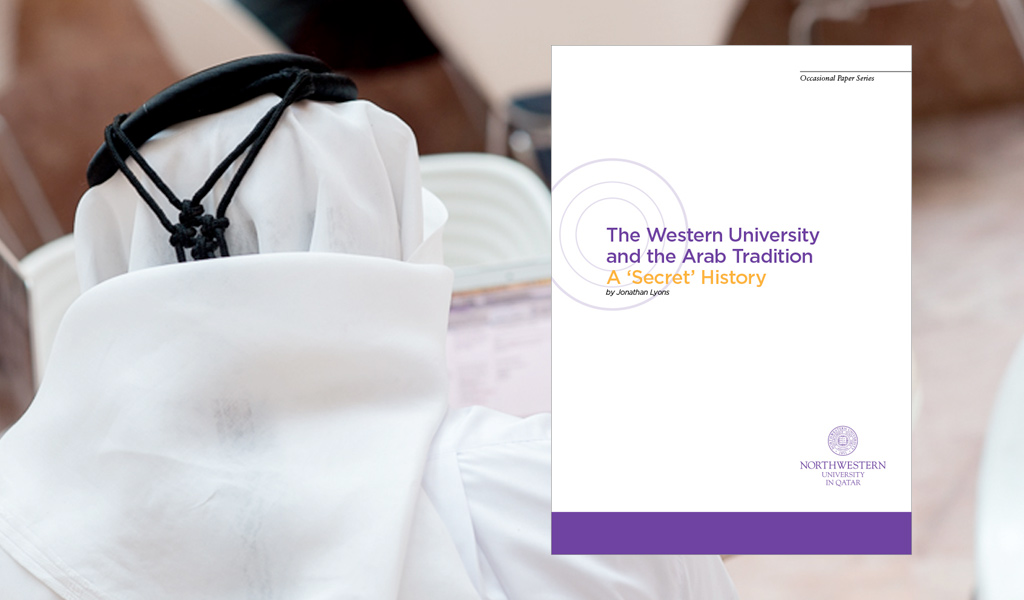What has been called “the secret history” of Arab influence in the foundations of higher education is the topic of an occasional paper published this month by Northwestern University in Qatar. Long before colleges and universities thrived in Europe, Arab centers of learning were thriving, the paper posits.
The Western University and the Arab Tradition: A Secret History is an expanded version of a convocation address at NU-Q in August 2015 given by Jonathan Lyons, a historian and former journalist who is an expert on the intellectual history of the Middle East.
As NU-Q Dean and CEO Everette E. Dennis put it, “the important role that Middle East scholars played in the development of knowledge is often ignored or overlooked. This paper is published out of respect for the Arab intellectual tradition in higher education at a time when new educational developments are taking place in the Middle East. While today, European and American institutions are involved in that development, the contributions of early scholars and thinkers made all this possible.”
Lyons spent a week at NU-Q last academic year meeting with faculty and students, lecturing and contributing to workshops and discussions. Known for his seminal book, The House of Wisdom, which chronicles the role of early Arab mathematicians, philosophers, and other thinkers, he is the author of several books on the Middle East and higher education traditions.
In his paper, Lyons explores how the Arab tradition has affected the creation of higher education in the West, claiming the Western narrative has established a “monopoly … on the idea of science and, simultaneously, strengthening the narrative of the relative backwardness or even outright failure of non-Western traditions—Arab, Chinese, Hindu, and others.”
In addition to illustrating how several organizational and institutional components of the Western tradition can be found earlier within Muslim traditions, he also points to the core mission of a liberal arts education as having its roots in the Arab world.
“The Arab contribution was both invaluable and unmistakable, for the scholars of Baghdad, Cairo, Cordoba, and other centers of medieval Muslim learning helped free their Western counterparts from the confines of religious speculation and directed them toward the study of what the philosophers of the day called The Nature of Things—in other words, toward Science,” Lyons writes.
Lyons goes on to describe the transfer of knowledge from the East to the West, and the role that the Arab world played in developing what is referred to as the “core curriculum,” which arrived at the University of Paris in 1230. Prior to that, Lyon states, “Generations of Muslim scholars—all committed monotheists, like their new Christian readers—had already spent centuries seeking to harmonize pagan Greek philosophy with the tenets of their faith; and, unlike Aristotle and his school, they were deeply interested in connecting metaphysics to their own understanding of the one true God.”
In his conclusion, Lyons offers some lessons for today, including what he calls a “dramatic rethinking of the Western idea of Islam.”
“In setting aside the central pillars of this discourse, including the notion that Islam is inherently and irredeemably anti-science, and thus anti-modern, as flawed representations of the non-discursive reality of the Muslims, it becomes possible to imagine new and different relationships between East and West. This is all the more the case when the deep ties and interrelationships between the worlds of Islam and the West are reinstated to their proper place, in science, philosophy, and even theology. After all, Max Weber, the father of modern sociology, argued one hundred years ago that Islam and Christianity are both western religions.”
Lyons is a former correspondent for the Reuters news agency, received his doctorate in sociology at Monash University and has taught at Monash University, George Mason University, and the Center for Muslim-Christian Understanding at Georgetown University.
Lyons’ presentation at the university’s annual convocation for new students was greeted enthusiastically by students, parents, and the faculty, it was reported. “That is why we asked him go expand his remarks so we could share this vital history with others,” the dean said.
Download the paper in: English | Arabic - العربية

